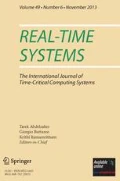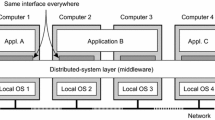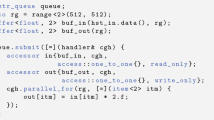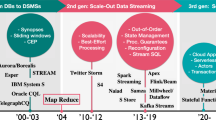Abstract
Real-time distributed systems include communicating tasks that interact via message-passing. In such systems the timely delivery of messages is essential for meeting task timing constraints. Consequently, in addition to task execution times, message delivery times must also be constrained. In order to minimize the number of failures to meet timing constraints message communication protocols, in addition to task scheduling algorithms, play a crucial role. A legitimate question to ask is whether making such protocols adaptive to run-time system and environment status can significantly improve system performance. Consequently, a rum-time monitoring approach to adaptive real-time distributed systems is proposed; the work focuses on an investigation of adaptive message communication protocols and corresponding run-time support mechanisms. Simulation is used to obtain performance results. It is concluded that although improvement is obtained it ,ay not be significant enough to offset the increased overhead and requirement for task information.
Similar content being viewed by others
References
Bertsekas, D., and Gallager, R. (1987). Data Networks, New Jersey: Prentice-Hall.
Chenk, B., Agrawal, G., and Zhao, W. 1992. Optimal synchronous capacity allocation for hard real-time communications with the timed token protocol. Proceedings of the Real-Time Systems Symposium, pp.198–207.
Cristian, F. 1989. Probabilistic clock synchronization. Distributed Computing 3: 146–158.
Gopinath, P., and Gupta, R. 1990. Applying compiler techniques to scheduling in real-time systems. Proceedings of the Real-Time Systems Symposium, pp. 247–256.
Grow, R. M. 1982. A timed token protocol for local area networks. Electro '82, Token Access Protocols, 17/3.
Hamdaoui, M., and Ramanathan, P. 1993. Selecting timed token protocol parameters to guarantee the deadlines of real-time messages. The First Workshop on Parallel and Distributed Real-Time Systems, Newport Beach.
Haban, D., and Shin, K. G. 1990. Application of real-time monitoring to scheduling tasks with random execution times. IEEE Transactions on Software Engineering 16(12): 1374–1389. Also in Real-Time Systems Symposium 1989, pp. 172–181.
Halang, W. A., and Stoyenko, A. D. 1991. Constructing Predictable Real-Time Systems. Kluwer Academic Pulishers.
Halpern, J., and Suzuki, I., 1991. Clock synchronization and the power of broadcasting. Distributed Computing 5(2): 73–82.
Jain, R. 1991. Performance analysis of FDDI token ring networks: Effects of parameters and guidelines for setting TTRT. IEEE LTS, pp. 16–22.
Kopetz, H., Damm, A., Koza, C., Mulazzani, M., Schwabl, W., Senft, C., and Zainlinger, R. 1989. Distributed fault-tolerant real-time systems: The MARS approach. IEEE Micro 9(1): 25–40.
Kopetz, H., and Ochsenreiter, W. 1987. Clock Synchronization in distributed real-time systems. IEEE Transactions on Computers 36(8): 933–940.
Kurose, J. F., Schwartz, M., and Yemini, Y. 1983. Controlling window protocols for time-constrained communication in a multiple access environment. Proceedings of the 8th Data Communications Symposium 13(4): 75–84.
Kurose, J.F., Schwartz, M., and Yemini, Y. 1984. Multiple-access protocols and time-constrained communication. ACM Computing Surveys 16(1): 43–70.
Leung, J. Y., and Merrill, M. L. 1980. A note on preemptive scheduling of periodic, real-time tasks. Information Processing Letters 11(3): 115–118.
Lawlor, E. L., and Martel, C. U. 1981. Scheduling periodically occuring tasks on multiple processors. Information Processing Letters 12.
Molle, M. L., and Kleinrock, L. 1985. Virtual time CSMA: Why two clocks are better than one. IEEE Transactions on Communications 33(9): 919–933.
Oh, S. K. 1994. Behavior Monitoring for Adaptive Real-Time Distributed Systems. Ph.D. thesis, Queen's University, Kingston, Ontario.
Pleinevaux, P. 1992. An improved hard real-time scheduling for the IEEE 802.5. The Journal of Real-Time Systems 4(2): 99–112.
Panwar, S. S., Towley, D., and Wolf, J. K. 1988. Optimal scheduling policies for a class of queues with customer deadlines to the beginning of service. Journal of the ACM 35(4): 832–844.
Pouzin, L., and Zimmermann, H. 1978. A tutorial on protocols. Proceedings of the IEEE 66(11): 1346–1370.
Ramanathan, P., Kandlur, D., and Shin, K. G. 1990. Hardware-assisted software clock synchronization for homogeneous distributed systems. IEEE Transactions on Computers 39(4): 514–524.
Sevcik, K. C., and Johnson, M. J. 1987. Cycle time properties of the FDDI token ring protocol. IEEE Transactions on Software Engineering 13(3): 376–385.
Strosnider, J. K., and Marchok, T. E. 1989. Responsive, deterministic IEEE 802.5 token ring scheduling. The Journal of Real-Time Systems 1(2): 133–158.
Stankovic, J. A., and Ramamritham, K. 1987. The design of the Spring kernel. Proceedings of the Real-Time Systems Symposium, pp. 146–157.
Shen, C., Ramamritham, K., and Stankovic, J. A. 1990. Resource reclaiming in real-time. Proceedings of the Real-Time Systems Symposium, pp. 41–50.
Strosnider, J. K. 1988. Highly Responsive Real-Time Token Rings. Ph.D. thesis, carnegie Mellon University.
Tanenbaum, A. S. 1981. Computer Networks. New Jersey: Prentice-Hall.
Zhao, W., and Ramamritham, K. 1987. Computer Networks. New Jersey: Prentice-Hall.
Zhao, W., and Ramaritham, K. 1987. Virtual time CSMA protocols for hard real-time communication. IEEE Transactions on Software Engineering 13(8): 938–952.
Zhao, W., Stankovic, J. A., and Ramamritham, K. 1990. A window protocol for transmission of time-constrained messages. IEEE Traansctions on Computers 39(9): 1186–1203.
Author information
Authors and Affiliations
Rights and permissions
About this article
Cite this article
Oh, S.K., Macewen, G.H. Task behavior monitoring for adaptive real-time communication. Real-Time Systems 11, 173–195 (1996). https://doi.org/10.1007/BF00365317
Issue Date:
DOI: https://doi.org/10.1007/BF00365317




